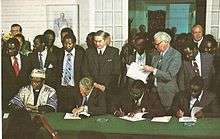Internal Settlement

The Internal Settlement was an agreement which was signed on 3 March 1978 between Prime Minister of Rhodesia Ian Smith and the moderate African nationalist leaders comprising Bishop Abel Muzorewa, Ndabaningi Sithole and Senator Chief Jeremiah Chirau. After almost 15 years of the Rhodesian Bush War, and under pressure from the sanctions placed on Rhodesia by the international community, and political pressure from South Africa, Great Britain and the United States, the Rhodesian government met with some of the internally based moderate African nationalist leaders in order to reach an agreement on the political future for the country.
The agreement led to the creation of an interim government in which Africans were included for the first time in Rhodesia. This in turn was to lead to the achievement of the settlement's main goal which was for the country to gain international recognition, which in turn implied that sanctions imposed on Rhodesia which came about as a result of the announcement of the Unilateral Declaration of Independence of 1965, would be abolished.
Following the agreement, the election of March 1979 was held which brought Muzorewa and his UANC party to power. The electorate was not qualified by race, but purely on meeting certain conditions, such as educational standard and/or income and/or worth of property owned enabling a majority of Africans to vote for the first time. The election process was witnessed by international observers, who were in agreement that the process had, in the main, been free and fair.
Zimbabwe-Rhodesia
A new government of national unity with Bishop Abel Muzorewa as Prime Minister took office on 1 June 1979. The country was renamed Zimbabwe Rhodesia and a new national flag was raised signifying the transition. It was expected that all sanctions would be lifted now that the country was under democratically elected black majority rule. However, the lifting of sanctions did not occur mainly because the externally based African nationalist parties of ZAPU and ZANU, under the respective leadership of Joshua Nkomo and Robert Mugabe, had not been involved in the political process and had not participated in the general election. Under mounting international pressure, particularly from Jimmy Carter, Andrew Young and the British Government, Muzorewa was persuaded to take part in negotiations at Lancaster House late 1979.
The agreement at the Lancaster House Conference between the Zimbabwe Rhodesia and British Governments, ZAPU and ZANU in December 1979 resulted in a ceasefire and the end of the Rhodesian Bush War. The country returned to legality under direct British rule with Lord Christopher Soames as Governor, thereby ending the rebellion against the British Crown caused by the signing of Rhodesia's Unilateral Declaration of Independence in November 1965. Under the terms of the Lancaster House Agreement, fresh elections were held in February 1980 following which the country attained its independence as the Republic of Zimbabwe on 18 April 1980 with Robert Mugabe as its first Prime Minister.
Reaction
The internal settlement was condemned by United Nations Security Council Resolution 423 of 14 March 1978, declaring illegal any internal settlement in Southern Rhodesia. The US, the UK, France, Canada and West Germany abstained from the vote.[1]
Further reading
- Catholic Institute for International Relations, Catholic Commission for Justice and Peace in Rhodesia. Rhodesia After the Internal Settlement, 1978.